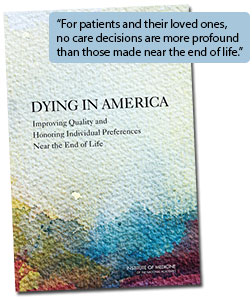This 500 page report released by the Institute of Medicine brings attention to some major themes about death:
- Having to make decisions about a loved one's care is never easy, but having to make these decisions at the end-of-life is a life-changing experience.
- The majority of us do not have conversations about end-of-life with anyone—our doctors, family, friends, or attorneys.
- When a loved one nears the end of her life and is not physically, mentally or cognitively able to make decisions about her care, we often feel helpless and frustrated that acute hospital care is causing unnecessary discomfort and unwanted and costly care that does not reflect our loved one's values, goals and preferences.
- Although we do not always sign advanced directives and make other plans for our death, we all want end-of-life care to be compassionate, affordable, sustainable and the best quality possible.
- The need for families to provide caregiving for a loved one is increasing daily. Family members take on tasks such as providing personal care, household chores, paying bills and managing medication which are cumulative (keep increasing) and progressive (never let up).
|
 |
A major recommendation of the report that hit home with me was the call for public education that normalizes conversations about death and dying. In my first year practicing elder law, I have had the privilege of talking about death and the process of dying with many clients. And while family members are most often seeking advice about end-of-life care and how to pay for it, I find myself asking, "Are you ready for your loved one to die?" It is from this sacred conversation that people are able to start developing the best, most appropriate plan of care for themselves and their loved one.
This month, I provided my Introductory 101 seminar entitled, "End of Life Transitions, An elder lawyer's perspective on proactive planning for yourself and your family," to a focus group of professionals. This educational seminar is the result of my determination that too much information and advice about long-term care is often confusing, inconsistent and has a fearful spin that leaves one feeling like they should do this, buy that, or act now or face something really horrible. I know how difficult it was for me to understand the various levels of care and whether and how people might qualify for public assistance to pay for care. This seminar is my attempt to provide a basic overview of long-term care so that with this foundation, families can dig deeper into other seminars available in the community on "asset protection, medicaid planning and financial planning to maximize funds to pay for care & retirement."
I am offering this seminar free in my office as well as in the community. If you would like for me to present to your group, organization or extended family, please contact my office to make the arrangements.